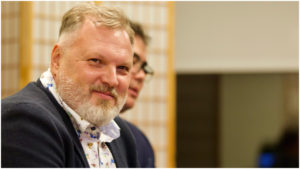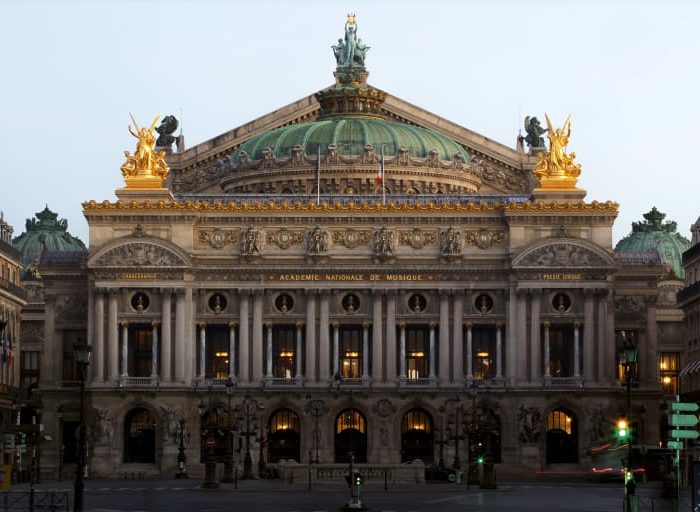
Dr. Vadim Zhuravlev On Russian Opera In A Post-Soviet Era
By Logan Martell(Photo Credit: Jonathan Levin)
On Oct. 9, 2019, Eurasia Festival presented “Russian Opera Today,” a seminar and discussion given by Dr. Vadim Zhuravlev. A noted figure in Europe’s performing arts world, Dr. Zhuravlev has served as Director of Artistic Programming at Moscow’s Bolshoi Theatre, with his writings appearing in publications throughout Russia, Germany, and France. Translating for Dr. Zhuravlev was Eurasia Festival president, Aza Sydykov. The evening’s seminar focused upon the state of affairs in opera and the performing arts in Russia after the collapse of the Soviet Union, considering aspects such as management, financing, repertory choices and more.
Zhuravlev opened by touching on the significance held by opera in his life, noting that in his experience, he has seen a number of sad tendencies which he wants to shed light on in the hopes of meaningful reform. “It is my hope that since the collapse of the Soviet Union, almost 30 years ago, that Russian theatre would produce a new generation of artists. However, many of the practices and mechanisms in place remain from the regime, making this difficult if not impossible.”
On the Theaters
Utilizing slides, Zhuravlev stated that, of Russia’s 66 theaters, 35 are opera houses, with the remaining 31 being used for operetta, ballet, or musical theatre; only seven of these theaters receive federal funding. The two theaters with the largest budgets are the Bolshoi at approximately 135 million Euros, followed by the Mariinsky Theatre at 104 million; the next largest are the Novosibirsk Theatre and Primorskaya at 30 and 14 million, respectively.
One sad tendency, Zhuravlev noted, is the mismanagement of funds, explaining that there are often many cases where money is moved around under the guise of infrastructure repairs and renovations. One instance during Dr. Zhuravlev’s time with the Bolshoi Theatre saw Russian President Vladimir Putin offer the theatre a multi-million dollar deal for reconstruction that was to take place over the span of three years. A project which he says ultimately took six years to finish, at a cost equivalent to three billion dollars. According to Zhuravlev, it is not uncommon for theatres who receive a new director or general manager to immediately begin reconstruction.
The Bolshoi Theatre’s place in the heart of Russia has allowed it to enjoy a unique benefit, thanks to a provision still in place from the Soviet era, wherein the theatre is assured funding from the federal government’s budget. Currently, this advantage is being contested by the Mariinsky Theatre, who makes a strong argument based on the number of productions they stage, with Zhuravlev noting that even someone such as Valery Gergiev, currently Mariinsky’s general director, cannot seem to truly affect the desired change in securing federal support.
Artists and Repertoire
Another tendency which Zhuravlev discussed was that of artistic compensation, where in the most extreme cases the salary for an artist would be roughly $100. Because of this, Zhuravlev has seen a trend emerge where up and coming Russian artists engage in lengthy performance tours abroad, allowing them not only a more profitable salary, but to also use that international fame to negotiate a better rate when they return to Russia.
The increasing desire for federal support has influenced the repertory choices of Russia’s theaters. According to Zhuravlev, these houses steer towards more conservative choices for productions and works, preventing any true innovation to take place. There is also a hesitance among directors and conductors to reimagine certain Russian works which hold a place as classics in the eyes of the public. As Zhuravlev elaborated, there is a possibility for scandal due to a variety of factors with public outcry able to arise from the church or state levels as well. One such instance cited was a production of Wagner’s “Tannhauser,” which received significant backlash from the Russian Orthodox Church due to the production’s use of footage from the film “The People Vs. Larry Flint,” which depicted Christ’s crucifixion against a sexually explicit backdrop. Another example being a production of Verdi’s “Aida,” which according to a local prosecutor, was said to be promoting suicide through its romantic framing. These factors, among others, create a drought of artists and directors, resulting in lackluster, or in some cases outlandish, productions. Zhuravlev believes part of the solution is management that is better able to negotiate deals in the favor of artists.
“Too often there are managers, who are former accountants or clerks, who do not bring with them an artistic vision,” says Zhuravlev. “Because of the lack of world-class management, works can often begin and end late, leading to members leaving due to travel considerations.”
“Despite this presentation being rather negative in tone,” Zhuravlev says, “It is my desire to see Russian opera flourish and prosper, and I believe it is my personal mission to speak up.”
Categories
News


